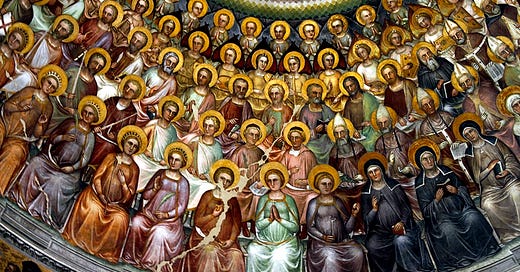Modern mainstream Protestant Christianity tends to reject the Communion of the Saints as described by Orthodox and Catholic Christians. In their conception, there is a finality with death and the living are not allowed to communicate with the dead, and vice versa.
I am not going to look at the arguments surrounding this doctrine, but we need to be aware of how Alfred adopted the traditional understanding of the Communion of the Saints.
The Vision of St Neot
One of King Alfred’s key spiritual advisors was St Neot. He would frequently meet with him to receive wise counsel and spiritual advice. St Neot died in 877, the year leading up to when Alfred would have to hide within the Somerset Levels.
While in hiding, the saint came to Alfred in a dream and prophesied.
“In the seventh week after the Resurrection of our Lord Jesus Christ from the depths below, I will head your army, then reassembled in the East, and in the power of the King Supreme, who will fight for you against the profane, I will give you victory from Heaven.”
This vision encouraged Alfred, so in the seventh week he set up hi army in Selwood Forest. As Alfred rested in his tent amongst the trees, the saint once again visited him and told the king to arouse his troops and make a surprise attack against the Danes. Alfred’s attack was underwhelming, but the shock of being attacked by such a small number caused the Danes to flee in panic.
During this battle the king saw, between Heaven and Earth, a man standing with Alfred’s standard. It was St Neot.
This story seems fantastical to our modern scientific minds, but if this is what the people believed, who are we to deny this. This encounter clearly inspired the deeply Christian King Alfred and he saw the victory as divine intervention.
During his time in the marshes, whom else ‘met’ with him? Whom else did he ask to pray for him? What other visions did he receive?
A recorded prayer we have from Anglo-Saxon times was called the Journey Prayer. It prays not only that the Trinity would save the traveller on their journey, but also asks for St Matthew, St Mark, St Luke and St John to be as a sword and armour to the traveller. The prayer calls on the patriarchs and matriarchs of the Bible to protect them too.
Abraham and Isaac and such men, Moses and Jacob and David and Joseph and Eve and Anna and Elizabeth, Sarah, and Mary too, mother of Christ, and also the brothers Peter and Paul, and also a thousand of your angels I call to my aid against all foes. May they lead me and protect me and preserve my going, keep me entirely and rule over me, guiding my work.
Again this feels so alien to our modern materialist and scientific sensibilities, to the point where Anglo-Saxon historians appear to quickly move past this ‘crazy Christian stuff’. But I think we should linger. This spiritual quirkiness forms the foundation of the English story. Who the English are, their psyche and disposition, are linked to the marshes where Alfred hid, and what unfolded there.
Next time, we will unpack more about St Neot’s impact on King Alfred’s thinking and the stories of Job and King David.





Splendid stuff as always, I didn't know about St-Neot, but really I'm quite glad that Alfred was canonized. He did everything for England that Charlemagne did for France. Honestly, really like him and how he never gave up on his people.
In my view I think England could use another ruler like him just as Scotland needs a new Causantin II.
Just fascinating, I could read about King Alfred all day. What struck me most reading about Alfred, is what we have lost today, that by invoking the Saints Albert, humbles himself, even being a king he humbles himself to needing help. When his victory came, therefore he believed it was not his victory, but that of God. This attitude that we have lost,kept us in our place, giving over to greatness not of ourselves, but that of others, namely, the Saints in this case. I believe that is one of the very big problems with our narcissistic society is that nobody credits their success entirely to others again, keeping our humility. Therefore this hubris runs rampant, breaking down the ties of our humanity, we become islands unto ourselves, hence the loneliness in the world when everyone is on their island, alone.